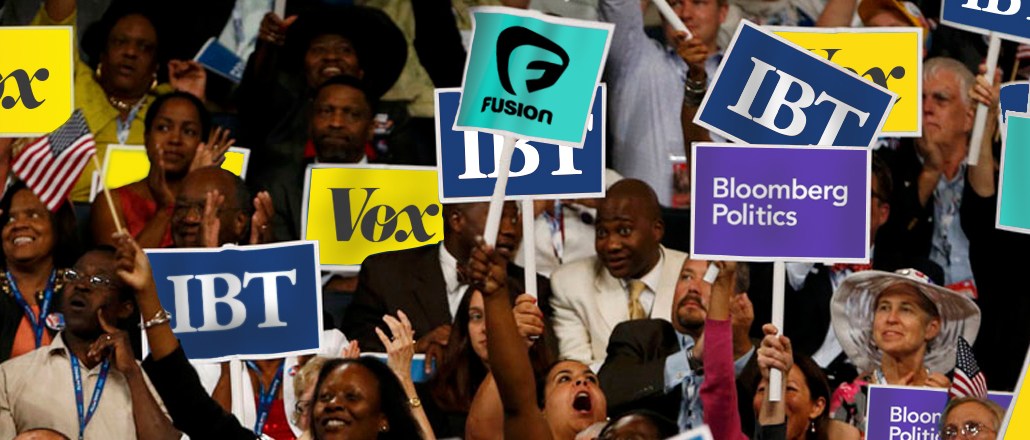
Once it was CNN rocking the boat. Then it was Politico, the frenetically paced upstart that upset the metabolism-challenged political news establishment. Now there’s a new wave of players that are seeking an audience, and there’s no better way than the 2016 election to show people what they’re made of. Call it the horse race of election-news coverage — and here’s how four of them are planning to win readers hearts and minds.
Bloomberg Media
In January, the media converged on Iowa for the first big gathering of Republican presidential hopefuls, and there was Bloomberg Politics, live-streaming the event. There are no bedfellows quite like business and politics, so as Bloomberg Media strives to reach a wider consumer audience, it stands to reason that its political-news arm would be the cornerstone of that effort.
The politics vertical started laying the groundwork last year, hiring Mark Halperin and John Heilemann to anchor a daily politics show on Bloomberg’s cable TV channel, and other big names like Tom Johnson from ABC News, Slate’s David Weigel and MSNBC’s Rob Gifford.
“Politics has always been important to Bloomberg’s overall mission,” said Johnson, who as executive editor leads a team of 30 employees. “Everything we’re doing now, it’s to be a leader on the coverage of politics right now, but we’re also building up to be a primary source of politics when the 2016 election really heats up.”
Fusion
Three-fourths of millennials plan to vote in the ’16 election, according to Fusion’s polling, which makes the election key to the 1-year-old ABC News and Univision venture as it tries to establish a foothold with young viewers and readers. Hillary Frey, who started in December as director of global news operations, said Fusion’s coverage would set itself apart with its issues-based reporting, Vine- and Instagram-exclusive content and contributions from Fusion anchors Jorge Ramos and Alicia Menendez. (She declined to quantify the number of people who would be covering politics, saying she would likely draw from a wide number of reporters whose issues coverage is relevant to the election.)
“It’s about getting the right content on the right platform and talking to them in the right language,” she said. “We’ll be looking at video, interactive, how we marry all those things together — things that are shareable and serious at the same time.”
Vox
Vox’s first interview with President Obama this month, which got more than 650,000 views on Facebook in its first five days, offers a view on the news upstart’s election-coverage plans. The video was focused on issues like income inequality and the role of government, annotated Obama’s answers with supporting charts and graphs, and was used as a jumping off point for analysis pieces, with the goal of having an evergreen quality, like much of Vox’s material.
“We’re looking to create content that lives beyond a single news cycle and can be valuable to our audience for a period of time,” said Laura McGann, a Politico vet who’s leading Vox’s political coverage. “We also want it to be exciting and interesting to our audience.” Vox plans to apply its wonky explainer approach to its election coverage, drawing from its 15 reporters who specialize in specific issues. “What’s really going to make Vox stand out is that we have reporters who know a lot about given subjects,” McGann said. “Our goal is to tell the story of politics through the substance of policy.”
IBTimes
There’s a lot of horse-race coverage, but true to its name, International Business Times plans to put a stake in the ground with its follow-the-money reporting. Under investigative reporter David Sirota, IBTimes has been publishing stories probing shadowy donations to Rahm Emanuel and Chris Christie’s questionable financial associations, setting the direction of election coverage to come.
“Political reporting tends to be caught up in style and positioning,” said global editor-in-chief Peter Goodman. “There’s a real shortage of accountability reporting.” Goodman has 30 people to deploy toward election coverage, but he expects to add to that: He just got the green light to hire a national and international staff, and some of those expected hires will be put on the election. “We are very much a national publication,” Goodman said. “We have very ambitious goals. Every news story is an opportunity to display what we’re about.”
More in Media

In Graphic Detail: The scale of the challenge facing publishers, politicians eager to damage Google’s adland dominance
Last year was a blowout ad revenue year for Google, despite challenges from several quarters.

Why Walmart is basically a tech company now
The retail giant joined the Nasdaq exchange, also home to technology companies like Amazon, in December.

The Athletic invests in live blogs, video to insulate sports coverage from AI scraping
As the Super Bowl and Winter Olympics collide, The Athletic is leaning into live blogs and video to keeps fans locked in, and AI bots at bay.





